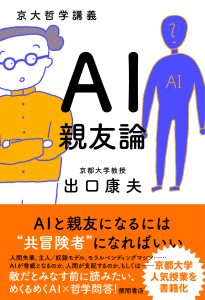国内最大級のAI(人工知能)関連メディア「http://Ledge.ai」の特設企画 Ledge.ai 23to24にて、出口康夫教授のインタビュー「AI進化の展望、人間中心主義への懸念とWEターンという代案」が公開されました。
Author Archives: kyotophil
2024年1月22日(月) 第6回日立京大ラボ・京都大学シンポジウム「人とAIの社会-AIが人格や道徳をもったら-」開催のお知らせ
日時:2024年1月22日(月) 13:00 – 15:00(12:00開場)
場所:東京コンベンションホール(オンライン同時開催)
アクセス:https://www.tokyo.conventionhall.jp/access.html
参加料:無料
参加申し込み:https://www8.hitachi.co.jp/inquiry/hqrd/event2/form.jsp
問い合わせ先:同上
プログラムなど詳細は日立京大ラボの告知ページをご覧ください。
日立京大ラボのリンク: https://www.hitachi.oi.kyoto-u.ac.jp/event/1085/
大西 琢朗 特定准教授が京大オリジナル、GREEN×GLOBE Partners、三井住友銀行主催のイベントに登壇します。
当研究室の大西 琢朗 特定准教授が京大オリジナル、GREEN×GLOBE Partners、三井住友銀行主催のイベント「open your…未来の考え方を考える」に登壇します。
開催日時
2023年12月20日(水) 18:00~19:30(予定)
京都大学国際科学イノベーション棟5階 シンポジウムホール
(YouTube Liveによるオンライン同時配信)
詳細については京大オリジナル株式会社の告知ページをご覧ください
https://www.kyodai-original.co.jp/?p=21224
出口康夫教授の単著『AI親友論』が発売されました。
著書の紹介
人間失業、主人/奴隷モデル 、モラルベンディングマシン……
AIが脅威となるのか、人間が支配するのか、もしくは――
敵だとみなす前に読みたい、めくるめくAI×哲学問答!
2045年に訪れるであろうシンギュラリティー。
私たちはAIに支配されてしまうのか、もしくはAIが人間の奴隷と化すのか、それともーーー。
真っ二つに割れがちなAI議論に、京都大学教授で哲学者の出口康夫が放つ新たな論点とは何か。
私たちがAIと親友になるにはどうすればいいのか。
AIと人間の関係性の転換点となる今こそ読みたい一冊。
出版社のページ
AI親友論 – 徳間書店 (tokuma.jp)
犬飼先生とシデリッツ先生の授業
2018年度台湾派遣
2018年3月に研究室の学部生、院生、ODが台湾にて諸々の学会へ参加、研究発表を行って参りました。詳しくはこちらの報告書をご覧ください。
CAPEレクチャー(Wen-fang Wang氏)のお知らせ
国立陽明大学からWen-fang Wang氏をお招きにして、CAPEレクチャーを開催いたしますので、奮ってご参加ください。
日時:2月1日(金)16:30-18:00
場所:京都大学総合研究2号館1階第10演習室 (No.34 of this map)
スピーカー:Prof. Wen-fang Wang (National Yang-Ming University)
タイトル:Why Is Weak AI, Let Alone Strong AI, Impossible — R. Penrose vs. S. Russell & P. Norvig?
アブストラクト:
By ‘weak AI’, the authors mean a computational machine whose observable and measurable performances are at least as good as those of an average matured human being in every respect involving intelligence, whereas ‘computational’ refers to a machine that takes series of digital signals as inputs no matter whether it has the ability to learn or not. R. Penrose argues in his The Emperor’s New Mind (1989) and Shadows of the Mind that computational weak AI is impossible (he does not exclude the possibility that some non-computational weak AI may still be possible). Penrose’s argument improves and evolves from that of J. R. Lucas in “Minds, machines, and Godel” (1961) but retains the core part of the latter, i.e., the appeal to Godel’s second incompleteness theorem. Penrose’s argument is no doubt a crucial one, simply in views of the number of citations before and after 1994. However, because of its complexity, Penrose’s argument has not been fully understood even after Penrose had collected 20 objections and responded (quite successfully according to my evaluation) to them in his 1994 book to avoid misunderstanding. For one example, perhaps also under the influence of J. Searle’s Chinese room argument, many philosophers still incline to think that weak AI is certainly possible while the strong one is not. For another example, computer scientists S. Russell and P. Norvig argue confusingly (according to my evaluation) in their influential book Artificial Intelligence: A Modern Approach (2009) that Penrose’s argument is implausible for at least three objectionable reasons. In this presentation, the authors will (1) reconstruct Penrose’s complex argument in a simple but sensible way, (2) point out the weakness and confusions in Russell & Norvig’s objections, and (3) therefore show the danger and limitation of the philosophical method of thought experiment. Russell & Norvig’s misunderstanding of Penrose’s argument shows especially that there is still a big gap of mutual misunderstanding between philosophers and computer scientists that has to be crossed over in order to get a breakthrough development both in AI science and in AI philosophy.
Keywords: weak AI, Godel’s incompleteness theorem, thought experiment, philosophical argument.
CAPEレクチャー(István Zárdai氏)のお知らせ
1月22日(火)に慶應大学からIstván Zárdai氏をお招きして、京都大学吉田キャンパスにおいてCAPEレクチャーを開催いたしますので、奮ってご参加ください。
また、Zárdai氏は前日の21日(月)にも立命館大学衣笠キャンパスにおいて、行為についての講演をなされますので、こちらにもぜひご参加ください。
日時:1月22日(火)16:30-18:00
場所: 京都大学文学部校舎地下小会議室 (No.8 of this map)
スピーカー:Dr. István Zárdai (Keio University)
タイトル:Is There an Essential Difference Between Actions and Events?
アブストラクト:Some philosophers – notably, John Macmurray and E. J. Lowe – have defended the claim that there is an essential difference between actions and events. The former are agents’ bringing about results and should not be conflated with the latter, which are merely events. In my talk I survey their arguments for this stance and identify its source. My diagnosis is that they are committed to think of persons as special sources of change. I argue that it is plausible to hold that persons have special capacities and abilities and these distinguish some of their actions from other events, nevertheless agents’ doings are still occurrences. These capacities and abilities can be made sense of as powers or dispositions, and their activation as an occurrence. This means that not only human agents can act, and their acts are not essentially different from other occurrences in the world. Hence, other agents – animals and sufficiently complex AIs for example – might be acting in similar ways.
————-
主催:立命館大学間文化現象学研究センター
共催:立命館大学人文科学研究所
日時:1月21日(月)16:30-18:00
場所: 立命館大学衣笠キャンパス 末川記念会館 第3会議室(http://www.ritsumei.ac.jp/accessmap/kinugasa/)
スピーカー:Dr. István Zárdai (Keio University)
タイトル:Intentional, Unintentional, Voluntary, Involuntary
アブストラクト:A large number of philosophers working on actions, mind and ethics have accepted since Donald Davidson’s ‘Agency’ that all actions are intentional under at least one of their descriptions. All such actions are rational in the sense that the agent performs them for a reason. They make sense to the agent and we can understand why the agent does them. I argue against this claim, and explore views, inspired by Aristotle’s and Aquinas’s positions, which deny that all action is intentional under at least one of its descriptions. Engaging with the work of Rosalind Hursthouse, Richard Teichman, John Hyman, and Hong Yu Wong, I argue that there are both intentional and unintentional actions, as well as non-intentional actions. Furthermore, actions can be unintentional and also voluntary or involuntary. And there is also a category of non-voluntary, arational actions. Many automatic movements belong into this last category. Hence, what counts as action is much broader than what we do for a reason, and as such, what is rational.
An International Round Table Discussion on Self のお知らせ
以下の要領でInternational Round Table Discussionが開催されます。奮ってご参加ください。
An International Round Table Discussion on Self
日時:1月11日(金) 13:00-14:30
場所:京都大学文学部校舎地下小会議室 (No.8 of this map)
発表者:
Prof. Yumiko INUKAI (University of Massachusetts, Boston) ‘A Self as a Fictitious Agent: Construction of a Self in Hume and James’
Prof. Yasuo DEGUCHI (Kyoto University)
Ms. Laÿna Droz (Graduate School of Letters, Kyoto University)
ワークショップ ‘Kyoto Workshop on Self I’ のお知らせ
12月18日(火)に京都大学吉田キャンパスにおいて、Denis McManus氏、Hibi Pendleton氏、Graham Priest氏と共に自己に関するワークショップを開催いたしますので、ぜひお越しください。
WSホームページ:https://sites.google.com/view/priestfest2018/related-events?authuser=0
Kyoto Workshop on Self I
日時:12月18日(火) 9:00-17:15
会場:京都大学楽友会館1階会議室(No.96 of this map)
Program
09:00–10:30 Denis McManus (University of Southampton) ”TBA”
10:30–10:45 Coffee
10:45–12:15 Hibi Pendleton (Colgate University) ”Ideals and Self-Clarification: Developing Iris Murdoch’s Concept of Vision”
12:15–14:00 Lunch
14:00–15:30 Yasuo Deguchi (Kyoto University) ”Self-as-We: From Entrustment of Somatic Agency to a Holistic Self”
15:30–15:45 Coffee
15:45–17:15 Graham Priest (CUNY) ”Fictional Objects Fictional Subjects“

